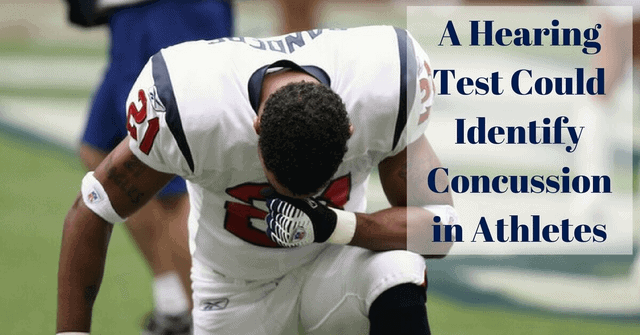Many athletes run the risk of getting a concussion from the sports they love. In fact, 10% of all contact sport athletes sustain concussions every year! Correctly diagnosing these injuries can be difficult though, since most players get up and shake it off after injuries on the field, and don’t realize until after the game that something might be seriously wrong. That’s where hearing specialists come in. A recent study showed that it’s possible to determine if someone’s had a concussion by performing a hearing test!
Concussions and Sports
Many athletes experience rough game play on the field and during practice, and these can cause serious injuries. It’s estimated that there are around 2 million sports related concussions in the US every year! This includes professionals, school athletes, and children. Football is perhaps the roughest game of them all, with football players having higher rates of concussions than any other group of athletes. It’s estimated that a professional football player gets hit in the head between 900 to 1500 times during each season! No wonder they suffer concussions.
What is a Concussion?
A concussion is a mild traumatic brain injury caused by a fall or a blow to the head. The brain is an organ that’s floating in cerebral spinal fluid inside the skull, and this fluid acts to absorb shocks and protect the brain. During a concussion though, the brain moves back and forth in the skull extremely quickly, damaging the neural pathways in the brain as it hits the hard walls of the skull. This affects the normal functioning of the brain, and has both short-term and long-term effects.
Wondering if you or someone you know has a concussion? Symptoms include fatigue, nausea, trouble remembering details or concentrating on tasks, difficulty sleeping, and even mood changes like feeling angry, upset, or depressed. The signs will usually begin right after the injury. Over 80% of athletes that suffer a concussion will also experience severe or debilitating migraines or headaches after the injury.
Diagnosing Concussions
Conventional testing for concussions usually involves a trip to the ER where a CT scan, MRI, or PET scan is ordered to see if the brain has sustained damage. These tests will show any internal bleeding, skull fractures, or lesions that lead to a concussion diagnosis. The shortfall of these tests is that they only show structural damage, and can’t be used to determine functional damage that affects behavior, mood, and concentration. Some other test is needed to determine the extent and severity of concussion damage.
An improper diagnosis of concussion injuries can lead to long-term health consequences, further injury, coma, or even death. The greatest risk is having a second concussion before the brain has healed fully from the first one. A second concussion can be very serious, leading to more lasting damage, so athletes should be kept off the field until it’s absolutely certain they’ve made a full recovery.
A New Test for Concussions
A recent study published in Scientific Reports showed that hearing tests rather than brain scans can determine if an athlete has suffered a concussion The neural signals in the brain aren’t firing normally after a concussion, and measuring these neural signal will show if the athletes have experienced a concussion.
Nina Kraus, the lead on this study, is a neurologist from the Northwestern University in Evanston in Illinois. She and her team placed three electrodes on the head to record neural signals and brain activity while playing sounds from a speech synthesizer. For those who’ve experienced a concussion, they’re not able to follow these speech patterns very well. Their follow speed is slower, and brain responses are smaller. Kraus also found that the more serious the concussion was, the harder it was for the brain to follow speech. This study revealed an extremely accurate way to test for and measure concussion damage.
The Future of Concussion Testing
Kraus realizes the implications of her study, and hopes to take this testing method to labs, schools, and sports complexes across the country. With this accurate testing method, tests can be performed immediately, and athletes can know if it’s safe to get back on the field the next day, or if they need to wait and heal. This not only makes testing a breeze, but saves lives, since playing too soon after suffering a concussion greatly increases the chances of sustaining further injury or another concussion.


